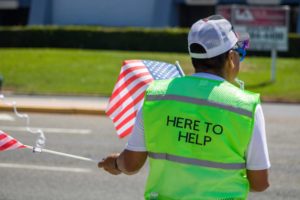Every year, about 63 million Americans — or about a quarter of the adult population — donate their time to local charitable organizations. On average, adults who volunteer spend about 52 hours a year on community service tasks.
 On the fourth Saturday of October every year, businesses, nonprofits, and volunteers unite together to serve their communities. This year, millions of Americans are expected to participate in National Make a Difference Day on October 23, 2021.
On the fourth Saturday of October every year, businesses, nonprofits, and volunteers unite together to serve their communities. This year, millions of Americans are expected to participate in National Make a Difference Day on October 23, 2021.
What is National Make a Difference Day?
National Make a Difference Day is a newer holiday, but its importance remains strong across the United States. The fall holiday was created in 1992 by USA Today’s weekend magazine and Points of Light, the world’s largest volunteer service organization.
In the two decades since its creation, volunteers have helped their local and regional communities by collecting bottles and cans for cancer research, repairing and repainting picnic tables and park equipment, or donating gently used shoes, coats, and clothes.
Today, nonprofits, school districts, local clubs, and even entire cities sponsor events to get volunteers into their communities to make a difference — both to those they’re helping and themselves.
Facts and Benefits of Giving
Community service is a great way to help organizations and people in need, but it also gives volunteers themselves a boost of serotonin. Volunteers in 2016 alone contributed about $193 billion worth of time to community service across the United States.
Most volunteers focus on one to two organizations they identify with and want to help in their spare time. The most common American volunteer activities are food collection, fundraising, general labor, and tutoring.
There are plenty of benefits to volunteering beyond just the accomplished tasks:
- Fill community needs: Whether it’s a small task like organizing a soup kitchen pantry or spending a day assembling playground equipment for a new park, volunteers are able to make projects happen that could have fallen to the wayside.
- Build new skills and share your own: Volunteers are often giving their time in an area of expertise or offering to help with something new to them. In both situations — learning new skills or teaching skills to others — is a great way to improve your community and yourself.
- Discover a new passion: Many students are required to volunteer during school, which in turn leads to young adults discovering new passions outside the high school walls. Community service is a way to continue learning about the world around you after graduation and stroke the flames of that passion for life.
- Network with neighbors: Getting out of the office and into the community gives you an opportunity to meet new people. Volunteering could lead to new lifelong friends, better job opportunities, or just some quality time with great like-minded people.
How Can I Give Back to My Community?
For those looking for new and exciting ways to volunteer with different communities in their area, there are tons of ways to give back. Here’s a list of 5 ways to volunteer with veterans:
- Provide transportation: Many organizations like Disabled American Veterans (DAV) or Angel Wings for Veterans offer free rides to doctor’s appointments and more.
- Preparing meals: Many organizations like Feeding America and Saving Our Vets need volunteers to organize food and water donations as well as distribute food and supplies to homebound veterans.
- Organize and staff events: From fundraising to social parties, volunteers are always needed to make events to honor veterans happen. Organizations like Soldiers’ Angels, Habitat for Humanity, Veterans Moving Forward, and National Veterans Wheelchair Games are often in need of support.
- Aid with medical and legal needs: Veterans’ medical and legal needs are often overlooked. Those with special training can volunteer at walk-in legal clinics, provide legal counsel, volunteer with PTSD and mental health campaigns, or volunteer at Department of Veteran Affairs (VA) facilities.
- Visit with veterans: Sometimes giving back means simply enjoying the company of others. DAV, Harbor Hospice, and many VA nursing homes allow visitors to read with, play games with, or just visit with veterans to brighten their day.
FSR’s community missions support the veteran and the military communities throughout the year.

